×
You will all remember my politics / religion dilemma when it came to writing the story for Scott Burton, the minister at St Matthews in Tay Street. I wanted to know we could even things up as we went, bringing balance to our tales of the Small City through the Big Personalities we know and love.
This week’s story then is all about a Perth boy who crossed continents on a quest to find his own peace and harmony, settling eventually in a Buddhist temple on the Northern Thai/ Burmese border. An epic tale stretching from Scotland to Thailand, you are about to discover the journey of a lost man who renewed his faith in life and met his one true love. Meet Graham Ross - Perth Boy, Buddhist Monk and Temple Volunteer.
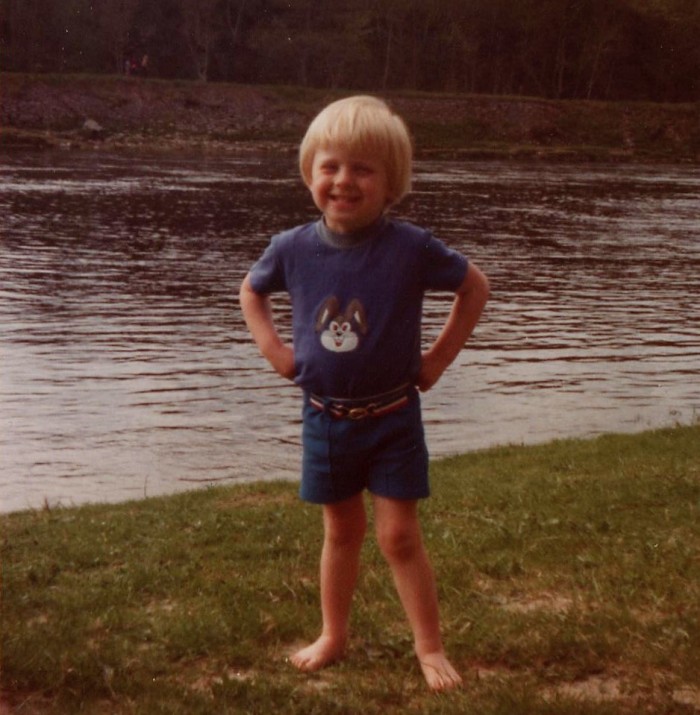
We’re going to start Graham’s story in 2006, when he was 34 years old. You’ll forgive me for skipping such a huge part of a young man’s life but it is at this point his path turned from the ordinary into the extra-ordinary. Graham worked as the General Manager at Healthworks health and fitness club based at Aviva, a role many of you will remember him from and one which suited his ordered, energetic personality to a tee.
He had worked his way through the ranks from lifeguard at Perth Leisure Pool, rescue boat driver at the stunning outdoor activity centre in Kinloch Rannoch, gym instructor for the Northern Police at Castlebrae and way back in his younger days had even spent an incredible summer teaching swimming to special needs kids in Florida as part of the Camp America program.
His personal passion for many years was snowboarding and racing down the side of a mountain in fresh powder with the wind at his back and the sun beating down on his face would be right up there at the top of his ‘Best Stuff Ever’ list. And if that was number one, number two would surely involve a live music concert - featuring both the Stone Roses and Otis Redding if possible! A happy life that revolved around his music, his friends, his sport and his family – in fact, on that note we better switch number one for spending time with his two much-loved nephews, Nathan and Owen.
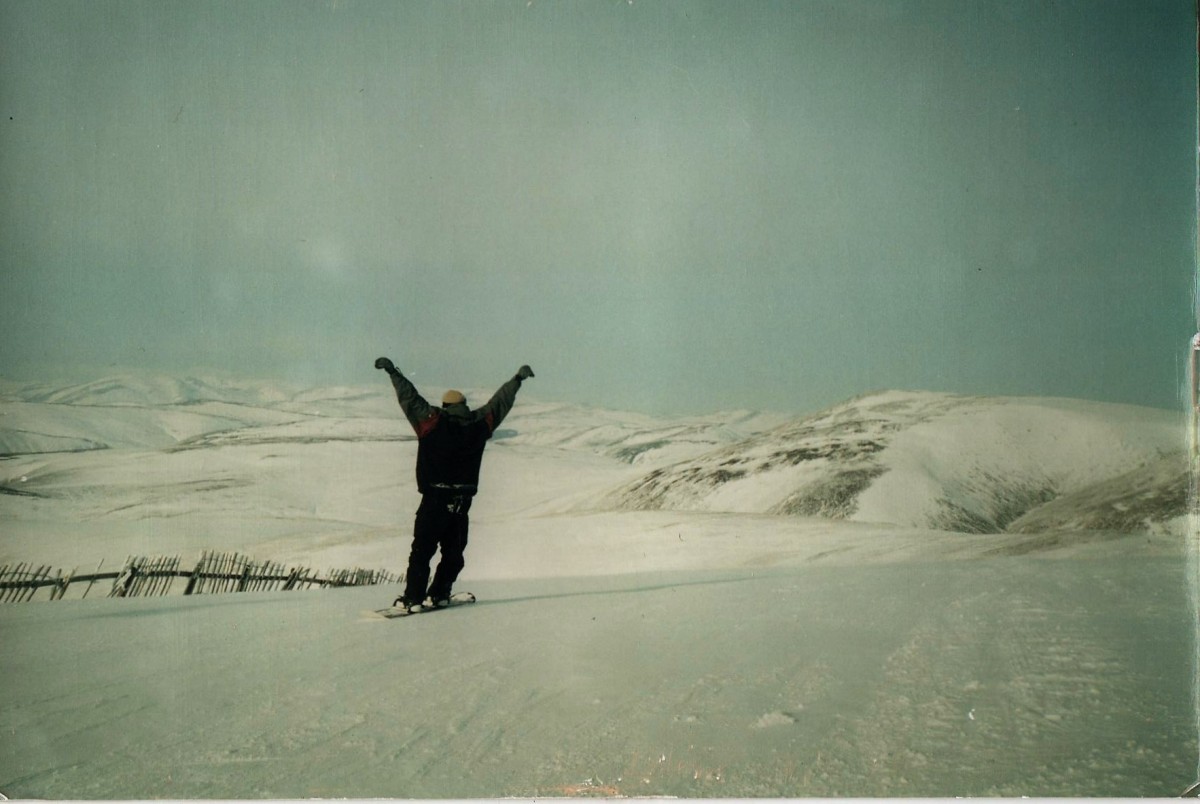
Healthy as an ox, when Graham went in for a routine operation to fix a tear in his rotator cuff (that’s his shoulder to me and you!) it was anticipated to be a short recovery period and then back to work. However, it was at this point that everything was about to change as Graham fell victim to one of the hospital borne infections that we have heard so much about in the news and across the media.
“It wiped me out. The thing about these infections is that they are often antibiotic resistant and can really hammer your immune system which leaves you wide open to pick up every other infection going.
This changed everything. I went home and tried to pick up my “pre hospital” life but it soon became clear that I couldn’t. Before the operation people would have described me as a fit and healthy guy. I golfed, loved to socialise, I took snowboarding holidays twice a year and I looked after myself.
My only real issue was the problem in my shoulder. Leading up to the op I had taken on a temporary role as Area Manager for Healthworks Scotland and looking back I probably pushed myself too much – in fact, I definitely did. I was in severe pain most of the time but was “too busy” to deal with it properly. There always seemed to be another contract meeting, another club event, another reason not to take the time off work which the shoulder operation demanded. But the thing is, I loved my job and I was having fun. I had won Manager of the Year, Club of the Year and my future with the company looked bright - I was passionate about working in my industry.”
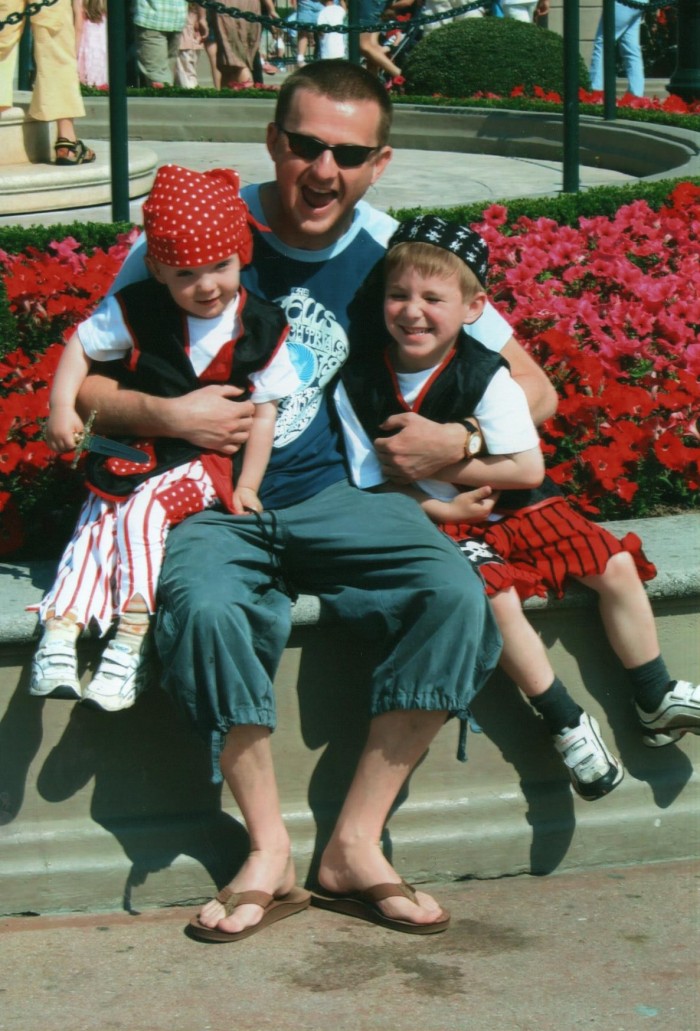
But as it turns out, all that extra stress and ignoring the pain set up the perfect conditions that made Graham susceptible to this bug. With months of pain causing poor sleep/rest cycles his immune system was already compromised before he went in. When the infection took hold he was back in and out of hospital for weeks. Eventually a doctor there told him off the record that that if I wanted to get well, I needed to get out of hospital – his immune system just couldn’t take the environment.
What was to follow was the rapid decline of a fit and healthy man in his mid-thirties. He struggled to get better; his torn shoulder was no longer a problem but his entire body was now weak and in pain. His physio couldn’t seem to get him to a position where going back to work wouldn’t be considered a daily battle. Eventually after months of trying to hide how bad he felt he moved back to his Mum and Dad’s in order that they could look after the day-to-day jobs a person takes for granted – cooking, cleaning and washing had all become insurmountable tasks.
“The biggest problem at this time was that it left me without a sense of who I was. Everything that had defined me was gone – Graham the manager, Graham the snowboarder, Graham the first one to suggest a night out on the town. It was all gone. I had no idea who I was but I did know that what was left was something that I hated.”
In 2007 he attempted to go back to work part-time as he had been living on rapidly dwindling company sick pay and the generosity of his amazing family. The company, he says, were very supportive during this period - patient and understanding - but very quickly upon his return he knew he’d made a mistake.
“I was in an environment where everyone knew the old Graham and I was putting so much pressure on myself to live up to that guy that it was impossible. I was so far out of my depth – just walking through the door was a nightmare. I was having panic attacks and I just wasn’t in a good place. Remember that my entire work life was based around health and fitness, about projecting a certain image, and I could hardly find the strength to get myself dressed in the mornings.
They offered to keep my job open but I had no idea what was going to happen. I couldn’t even function at twelve hours a week, I shouldn’t have been driving because of the brain fog and by this time I was suffering from severe sense hypersensitivity. I can’t think of a worse environment for me to have be in – bright lights, loud music, and to top it off surrounded by people engaged in all the fitness activities that I could only dream of doing.
I was at the stage where I just felt swamped by the physical and mental symptoms. That’s the thing with the illness I was eventually diagnosed with; I was always adamant it was physical, but as time went on it wore me down and the mental repercussions were unavoidable. It was catch 22 – I just kept thinking ‘I can’t do these things’ and that is torturous. I desperately wanted my life back.
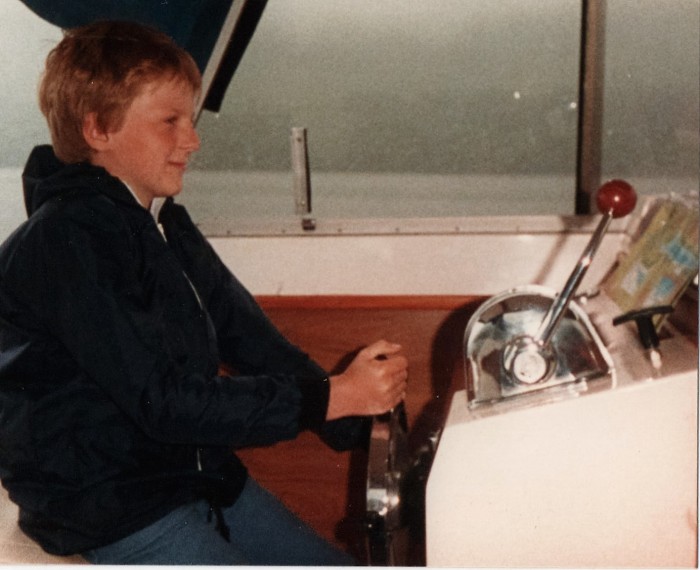
I vividly remember the day my Dad walked into my house and said ‘You need to come back and stay with Mum and I’ and me adamantly saying, ‘No, I will be OK, I just need time.’ But when I looked at him I knew I wasn’t okay and that I needed help. Going home to your parents when you’re a man in your mid-thirties isn’t easy. My family are brilliant and have been there for me every step of this painful path but it still felt like a defeat. I’d go to bed thinking ‘when I wake up tomorrow I’ll feel better. ’ I did this every night.”
Desperate for answers Graham started researching online, to try and find someone who had been through similar experiences and who could tell him they had come through it and had pulled their life back together, but there was just nothing.
“I was back and forth to the doctors, but all they could do was treat the symptoms. I was in huge amounts of pain by this time so I was on high doses of opiate based painkillers, anti-depressants, that sort of thing. It’s really hard to have any quality of life when you’re taking those. I was just numb.
Some of the doctors I saw during this time treated me like I was “imagining” things. Like this was the life I would actually choose to live? It was terribly frustrating; I remember losing it one day, I couldn’t accept that this was it. I said ‘I don’t care what this illness might be, just tell me what I need to do to get better?’ But at that time they couldn’t.
And that was the most frustrating thing. I felt as though no-one was looking at the whole picture so they couldn’t say what was wrong. Eventually, when they flagged up Fibromyalgia my first instinct was to say ‘No, I don’t have that’. But that’s the label I was given after a long and sometimes painful process of tests and appointments. That was my diagnoses. I hated that label – in fact, to this day I still do. To be honest for years it felt like “We don’t know what to call this so let’s just label it Fibro.”
Graham was fortunate to come under the care of the progressive Dr Hewitt who offered alternative treatments such as acupuncture and looked at a more holistic approach to easing the symptoms. When he retired though, and with the fibromyalgia label firmly in place, Graham was passed into the wider system and prescribed ever-increasing levels of painkillers.
“At this stage someone recommended I go to a Fibromyalgia support group which was held in Dundee and I really got my hopes up that this might be an opportunity to compare notes with other people on how to “beat” this illness. When I got there one of my biggest issues with this illness was staring me right in the face. This wasn’t a young man’s disease – the majority of people who have been diagnosed with it are women (7:1 ratio I believe) and the majority seemed to be, with all due respect, overweight and over fifty.
So I was the only guy in a group of women the majority of whom were using walking aids because, as I was reminded, fibromyalgia can often go hand in hand with rheumatoid arthritis. I think the talk that day was on how to fill your disability claim in correctly. I was crushed.
For me it was awful. Everyone was at the same hellish stage, where they had tried everything and were here as a last resort. There were no happy stories, no one saying ‘I got better’ and I really struggled with staring at my fate. I wanted to hear about the person who was fixed, who was swimming and running and working but he or she just wasn’t to be found. I couldn’t find that positive role model that I needed. Of course, what I didn’t realise at the time was that when people got “better”, they moved on. They were the lucky ones.
What I took from this and similar experiences, was that in many cases people had become their illness. When you spoke to them they talked of their pain, of their medication or their doctors appointments – everything that I was fighting so hard not to define me. I must have come over as a real jerk at times with my “not me” attitude but it’s just how I got through those days – I couldn’t lie down to it.
I was furious with the fact that this is what I’d come to – doped up on tramadol with expectations that were simply way too high. I was grieving for my own life. A good life that had changed overnight, at the flick of a switch and the cut of a scalpel.”
Graham explains to me the hidden aspects of the illness, of people commenting on how great he was looking. How difficult to explain to people that they only saw him when he was well enough to be out of the house, because on most days he couldn’t get out of bed. When he could, he looked ‘normal’ it was impossible for them to see what was really going on in his life.
“I remember I used to sleep in my living room chair because some nights I couldn’t even climb up the stairs to bed. And I was the guy who used to walk up ski slopes just to get one more run in at the end of the day after the lifts had closed.
I had always been a sociable person, up for a game of pool, a pint, a holiday to the snow. I liked a laugh, had loads of mates…. and with that I faced a whole different set of challenges as the people who you cared about peeled off and drifted away.
There were a handful of real friends who made a point of coming to see me, and of trying to understand but one thing I have come to realise over the years is that healthy people just don’t like to be around sick people. I think on some subconscious level it scares us. It reminds us how delicate our hold on things actually is.
I was very bitter about this for a long time which just led to me feeling even worse on the outside and the inside. The image I had of myself was so blurred. I became withdrawn and couldn’t leave the house; I just stopped doing everything. On top of everything else one of the most socially debilitating symptoms of the illness was the problems it caused with my stomach. It was often the case that I had to cancel things at the last minute and most people only put up with that for so long before they stop asking you to go places or dropping by the house. I did have a few people that refused to give up though and that’s pretty special.
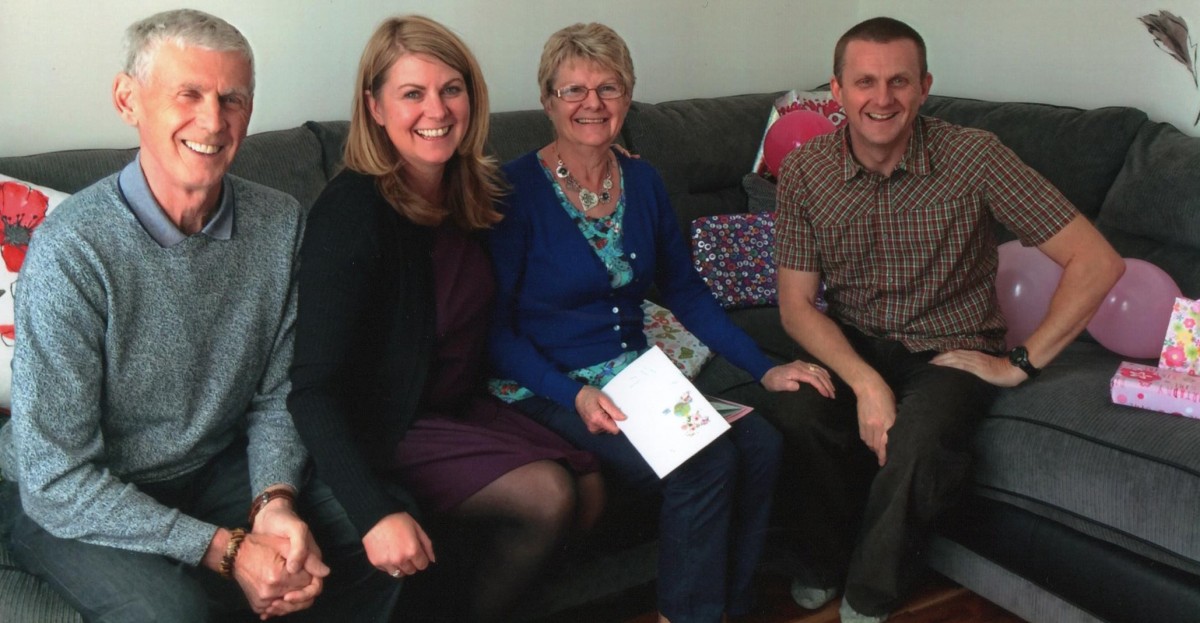
At this point I hit a real low. It just felt as though I couldn’t get out of the hole I was in. I sat in floods of tears one day and that’s when I knew that all my light had gone. I knew how low I was and all I could think was that I wasn’t prepared to live like this.
Anyone who knows me well though will tell you that I have a bit of a stubborn (ok total under exaggeration there) streak in me and it was at this lowest point that I found something there that still refused to be beaten. That wouldn’t be the way for me to go. I might have been at rock bottom but my story wasn’t over yet. It was two years on from having the operation that changed everything and I was thirty six years old. I had a loving, supportive family and a safe home. ‘Don’t quit’ was my final thought that day and it’s been my motto ever since.”
It didn’t happen overnight, but Graham began to gradually reduce his medication deciding where the costs of the side-effects were outweighing the benefits the drugs were meant to bring. He reached a point where he felt less like a zombie, less numb and it was enough to start pulling him out of the little, blinkered space he had come to live inside.
He was still beyond tired, wakening up every day feeling as though he’d never been to sleep.
“The complete exhaustion was the worst part. I’d open my eyes every morning and it would feel like I was dropped from a great height into the body of a 90 year old! Everything hurt and I was instantly tired. Even the word tired does it no justice – I wasn’t sleepy but was completely fatigued. There was just no let up from it. Even going to sleep was problematic as my body didn’t go into deep restful sleep and as such I woke up feeling like I’d “lived” a movie each night because my dreams were so horribly vivid. So it was a six hour nightmare only to wake up feeling like I had gone 10 rounds with the champ. Physical and mental exhaustion is used as a form of torture for a reason; it is debilitating.
I tried never to go down the “poor me” route but I know I was hugely frustrated and very often grumpy to those closest to me. I could see the effect all of this was having on my loved ones and this only added to how bad I felt about things. There wasn’t a lot of joy at that time but those closest to me kept on loving me through it all and that, more than anything, saved my life.
I knew things needed to change and no one was going to hand me the answers I was still looking for on a plate – it was up to me. I started thinking of all the things that I really wanted to do again in life and how I could get there, one step at a time. Swimming has always been one of my great loves and I thought back to some of the people that I had helped out during my career - those who I had taught to swim and those who I had been fortunate enough to help at the police rehabilitation facility. It was time to hit the pool. Talk about a reality check though – on that first visit back to Perth Leisure Pool I couldn’t even do one full length!
I remember looking up at the lifeguards thinking ‘I was one of you! I trained people like you! And then… I hope you’ve had good training because I might need resuscitated any second now!’ I went from being the most competitive guy in the pool to hoping I’d make it through a length without a lifeguard diving in to save me. Back in the old days if you were in a pool next to me, or on a board on the side of a mountain, we were racing. You might not know that, but we were. Now I was just happy to make it to the showers without needing CPR.
I went back ever day that I possibly could and to some extent swimming became my therapy. In the pool there is less pain as the body’s weight is supported by water. The exercise itself releases those lovely natural endorphins and in a quiet pool that “sensory overload” becomes wonderfully calmed. It is very meditative – great for mindfulness practice - and continues to heal me to this day.
Around the same time I was convinced to book into Rowan Consultancy for some formal counselling sessions. I had to start processing what had happened and that my life was now different. They helped me to begin to manage my expectations and deal with what was going on today. I stopped going to bed thinking ‘I’ll be better tomorrow’ because far from being positive, it meant I woke up disappointed every day.”
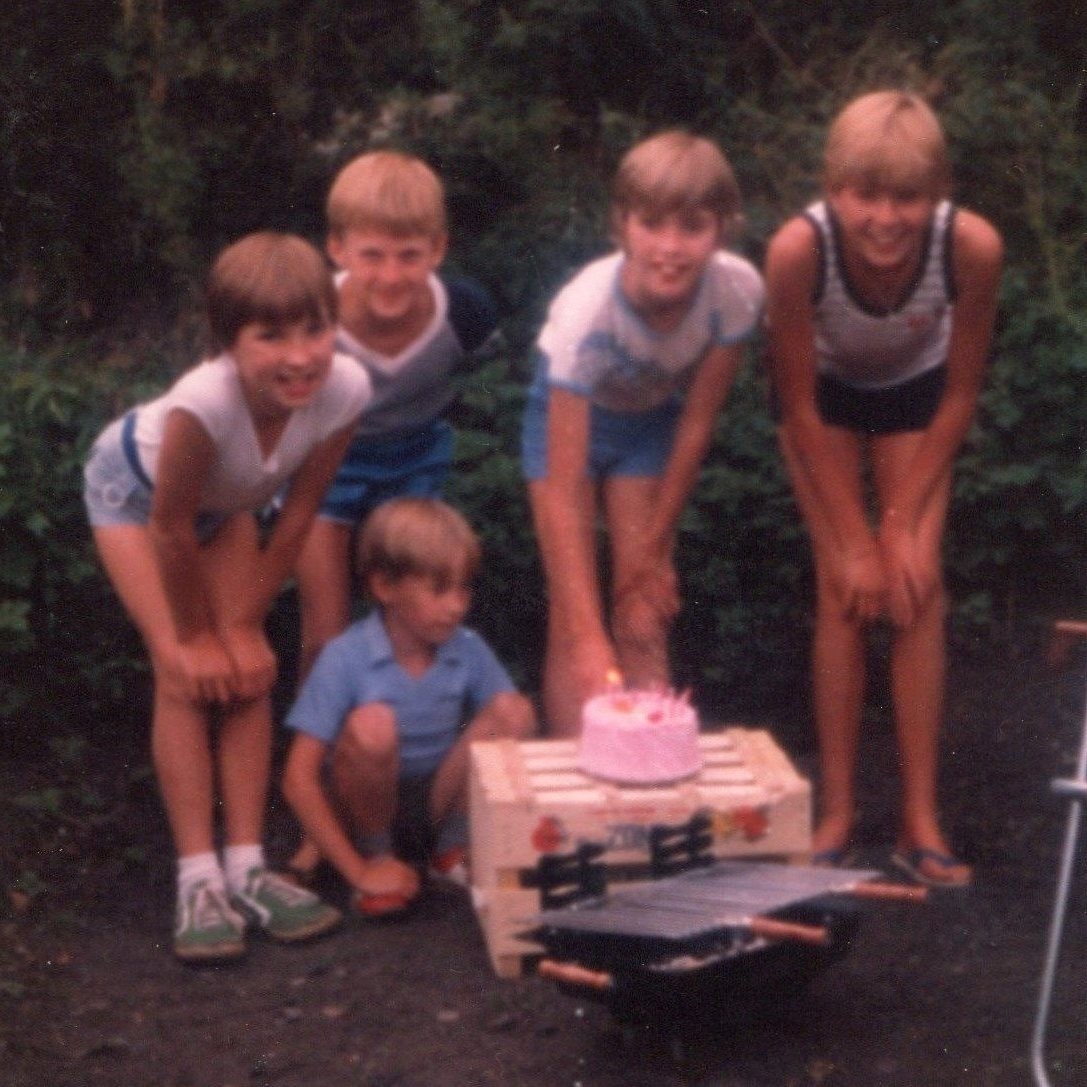 Graham is thoughtful as he tells me his story. When we spoke about him doing this he was unsure, badgered into it a little unfairly by me, a girl that he has grown up alongside, his older cousin by eleven days. We are pals, me and G. He is one of the cousins I have written about in my tales of ganghuts and Grandad’s stories. As we grew into teenagers we shared a group of friends. He is one of my favourite all time people, a joy of a boy who was as intense as he was carefree.
Graham is thoughtful as he tells me his story. When we spoke about him doing this he was unsure, badgered into it a little unfairly by me, a girl that he has grown up alongside, his older cousin by eleven days. We are pals, me and G. He is one of the cousins I have written about in my tales of ganghuts and Grandad’s stories. As we grew into teenagers we shared a group of friends. He is one of my favourite all time people, a joy of a boy who was as intense as he was carefree.
Some of my funniest, silliest stories involve my wee cus, we have shared laughs so deep and roaring that we thought we’d never stop, cried at the loss of our beloved nana and granddad, built secrets I couldn’t possibly write down here because our Mums will be reading. To understand what comes next, you have to appreciate that way before he was a sick, he was a wild, fun, hard-playing, hard-working man. He plays drums loudly, he does impressions with ease, he is kind and generous of spirit and everyone I know loves spending time in his glorious company.
We both knew this would be difficult, opening old wounds and talking about feelings so deep rooted that there was bound to be tears.
But the truth is, he had searched and searched for that positive story and had never found it. He knows that his own journey, back to a life where he wakens with less pain and volunteers and exercises, could be the tale that helps someone else at that low, low point. So we sit in Parklands, drinking tea and chatting for hours and hours, distracted by stories and trying not dwell on those black times.
And then you started feeling better – when was that?
“That was February 2009. I’d been back at the swimming and counselling and was started to go out and see people again. My friend’s Dad was in Thailand and he had lived with fibromyalgia for years and was dealing with it. She was a flight attendant and managed to get us cheap tickets and we headed off for a two week holiday – although it turned out the flights were an open return.
Thailand was someplace I’d wanted to go for a long time- I did a bit of travelling when I was younger but not a lot and it had always been regret. At that point I realised that I could take this unexpected chance and see a bit more of Thailand.
My snowboarding buddies always said that islands of Thailand were one place you could surf and so I headed for there! I did a little rock climbing in Krabi, walked for miles on white beaches and swam and swam and swam in the sea. Looking back it was a very important time for me, to be there on my own, a world away from everything. I met travellers who just knew me as Graham. I was writing my own story again and I emailed home and said ‘I’m going to stay for a little while’. I just really connected with Thailand.”
Graham had always had a connection to the Far East, and at an early age, as a way to calm his nerves before going on stage to play percussion in front of audiences, he had attempted to teach himself meditation (not something you hear often from a boy growing up in eighties Bridge Of Earn!). It was a little taste of another life and he became fascinated by the culture.
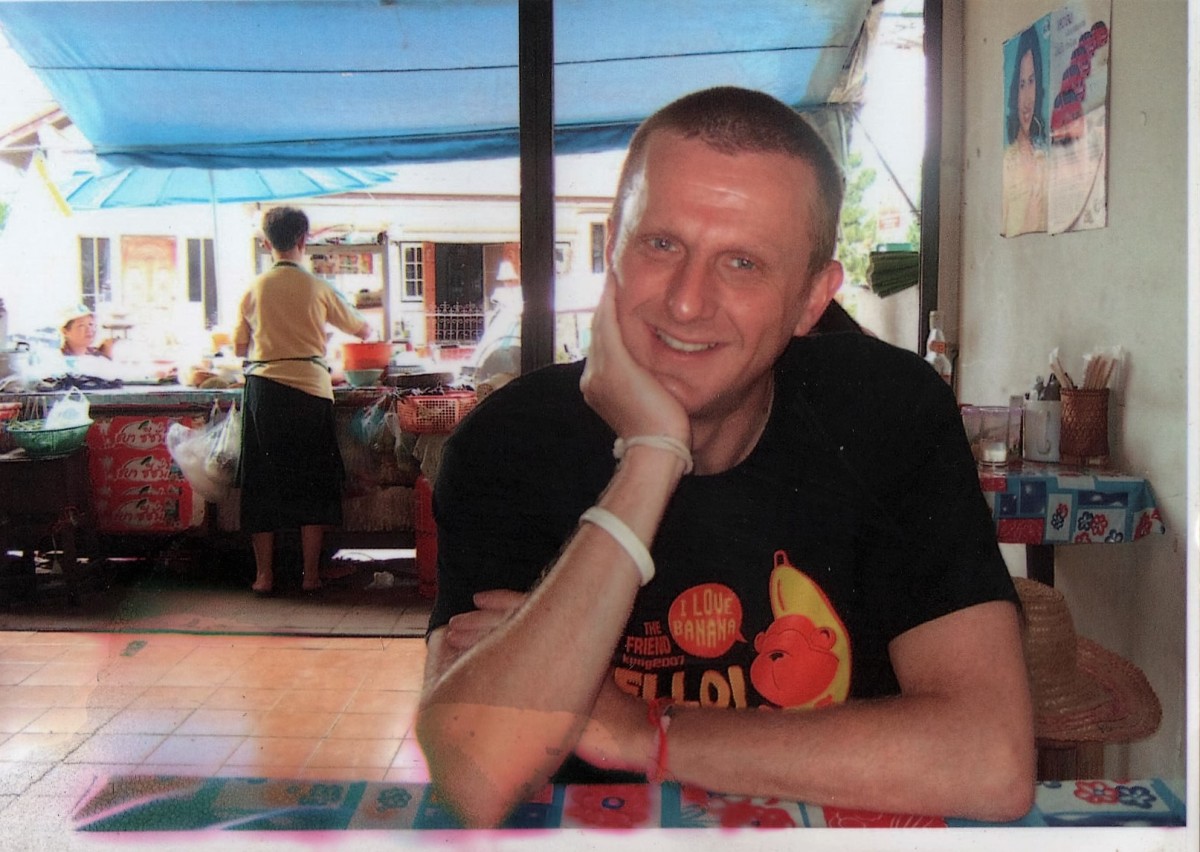
He saw this time in Thailand as a golden opportunity to explore but as he wandered through the temples he began to feel disrespectful at never having learned anything past a bit of karate and some dodgy meditation techniques. He wanted to learn more, to feel less like a tourist and to really submerge himself in Buddhist culture.
Cut to his mum looking through Facebook one day and coming across an advert for a temple stay program held in Northern Thailand; it was as far from the idyllic islands life as he could go but something drew him there and soon enough he had signed up.
He was 37 years old when he set out on a train journey that would change his life completely. On this train he met a girl called Mew who was heading to her uncle’s restaurant to help cover for someone who was off on sick leave. He ended up going with her for food and as is the way, the pair got talking…
“It was Songkran, Thai New Year, and Mew and her uncle’s were all heading North to the family home. When they learned I planned to spend Songkran on my own they insisted that I go with them as we were all heading North. I was, of course, interested in spending more time with Mew so I agreed no problem! I was the only non-Thai in the village and it was a huge party and great festival. Afterwards, upon explaining that I was heading to the temple to ordain they insisted they would take me. It is tradition for the family to take a boy to the temple and to support him on his way and they did that for me.”
Graham was ordained as a novice monk at Wat Sriboonruang as part of a temple stay program facilitated by the NGO Blood Foundation and his mind was blown. It was a life-changing journey. He met volunteers who were there to help other people, he was introduced to education projects for hill tribe people groups and offered comfort to the displaced refugees from across the border in Burma.
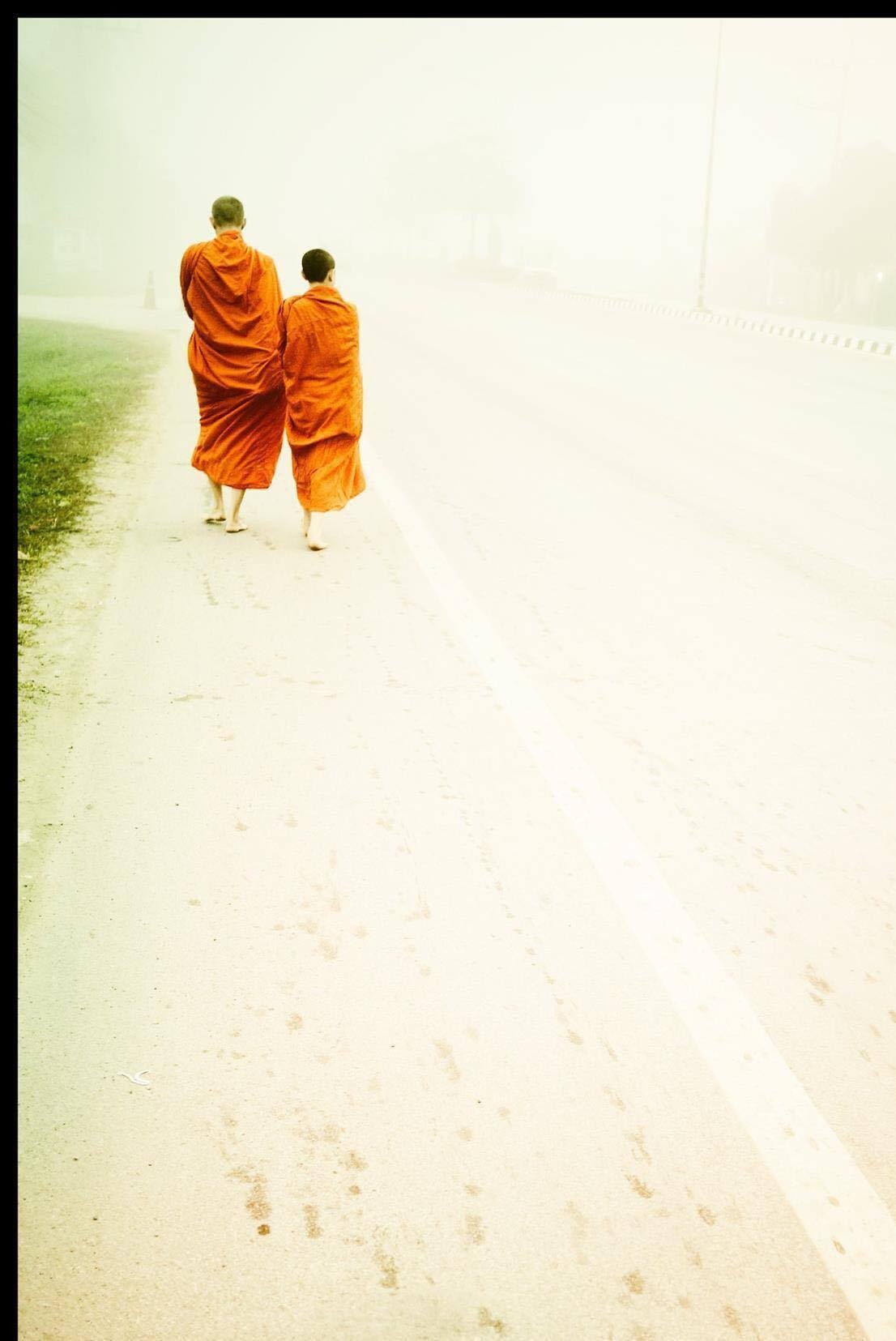 “It was truly humbling. These people had nothing – they were often literally standing in everything they owned. Their villages had been burned to the ground, the girls had been raped and the experience of watching this unfold and playing a small part in helping changed me on a deep level.”
“It was truly humbling. These people had nothing – they were often literally standing in everything they owned. Their villages had been burned to the ground, the girls had been raped and the experience of watching this unfold and playing a small part in helping changed me on a deep level.”
I ask him if Buddhism clicked right away for him.
“Yeah, yeah it did. I was given a very small but very important book by a wonderful monk named Ajahn Sumedho. It’s a collection of his teachings on the Four Noble Truths and it is the very heart of the Buddha’s teachings. I sat down, opened it and spent the next month reading that little book. Six years later and I’m still reading it to this day. Through study and mediation practice lots of things started clicking into place. It all started to make much more sense, as though someone had pulled a cloth from over my eyes and gone Ta Dah! You had to go through all of that darkness because that brought you to here – because of that you now have this. It started to really help me see things differently.
I had spoken in counselling at length about feeling as though I had a missing piece but to be honest it was more like a missing peace. At that temple, at that time I found a little of that. This was it for me. It didn’t happen overnight but I knew it was going to be my way, my path for helping me find the direction I needed.”
Graham spent only three weeks as a novice monk but that time in the temple started him on a new path.
“After leaving the temple I reconnected with Mew and asked her to come travelling with me. We took a slow boat down the Mekong , spent some time in Laos, visited Mew’s Mum in Malaysia and fell in love. During our big adventure I had a really bad flare up but Mew was so understanding of my illness and I found myself being able to be open and honest about everything with her. Over the years since, I’ve had bad flare ups again and again and she is always there, stopping me from going back to that place which is wholly insular.”
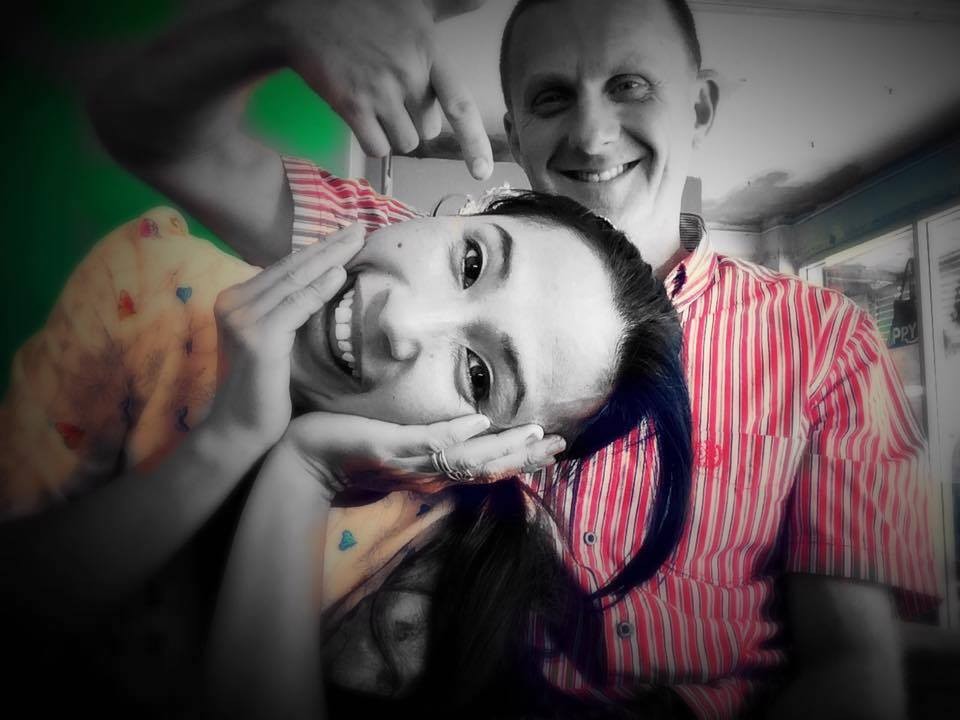 Graham is not fully well and it would be unfair to suggest that he was – that there was a perfect fairytale ending. However, from that time in the temple he has taken steps to change his approach to life through practicing mindfulness, meditation, leading a healthy lifestyle and taking a slower approach.
Graham is not fully well and it would be unfair to suggest that he was – that there was a perfect fairytale ending. However, from that time in the temple he has taken steps to change his approach to life through practicing mindfulness, meditation, leading a healthy lifestyle and taking a slower approach.
“Balance is the key for me. I’ve reduced the amount of time I’m sick and the recovery isn’t quite as drawn out but it remains challenging. My life was out of balance before. I still attend hospitals and the doctors of course but Mew being there for me, patient and understanding is a very special thing indeed.”
Graham knew he had to come home to sort out his affairs and set a plan in motion that could see him spend more time in Thailand and so he returned to Scotland and completed a TEFAL qualification, bagged himself a job at Brig Farm Shop and started saving his money in order to go back.
During this time one of the founders of Blood Foundation updated his Facebook status joking that he was so busy that he needed someone to work all day for very little pay and Graham jumped on it!
“I’ll take it!” he said.
“Are you serious?” they said
And he was. Graham headed back to Fang to begin volunteering with Blood Foundation. He spent his days helping to run the temple stay program, taking care of their volunteer program and assisting with the educational projects running along the border.
“I had good times there – Mew and I would drive up into the mountains on an old motorbike to visit the schools and pay the teachers’ salaries – all the while hoping that we would avoid the armed drug runners and people smugglers. We worked on some amazing projects during that time including supplying relief to refugee camps run by armed resistance groups who were fighting the Burmese. We helped educate groups of monks from Burma on how to help their communities with sanitation and food generation projects and then we started schools and helped people become monks – it was a world away from my desk at the GA.
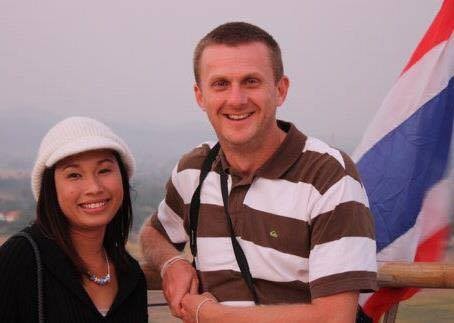
The ideology behind the foundation was that of inter-faith connection so there were people of all nationaltities, of all faiths working together. It was wonderful. It also gave me an opportunity to get out there and do something. There are very few jobs for westerners in Thailand so being there together, working alongside the amazing Thai people was a rare privilege.”
Graham found his true passion lay in the temple stay program and after Blood Foundation ceased their operations in Thailand he was invited by his soon to be mentor, Tan Acharn Dr. Apisit to restart the program. This was the man who would become responsible for helping to shape Graham’s understanding of the Dhamma and he willingly offered to help develop the new programme.
As is the way with life though, he then fell sick and with suspected MS had to return home to Scotland to be with his family once again.
“It was brutal. Being away from Mew was awful and it was a huge weight for us all to carry. I was home for just under a year and being away from her for all that time, having to go through all those tests and worry again was terrible. I think it was hardest on my Mum and Dad as they had been delighted that I was building a life again, even if it was so far away. We all pulled together though and it was again through the love, kindness and generosity of my Mum, Dad, sister Wendy and her family that we got through that time. I would be lost without them.
It was then through my lovely cousin Nicola that I met two more important people who really helped me during this time – the wonderful Graeme and Rhona Maxwell. Graeme gave me a few hours a week helping wash dishes, make cakes and deliver them out to his customers. It kept me sane during that period and let me save a bit of cash for going back. When you work with Graeme Maxwell you don’t have time to feel sorry for yourself and between these guys, they all got me through a very difficult period.
Thanks to Mr. Erikson at PRI I was referred to the wonderful Occupational Therapy team and I urge anyone who is going through a similar story to push for this. It felt that for the first time in a very long time I was able to speak to someone within the “system” who could empathise with what I was going through and actually had some really positive advice.
Once again I hit the pool and swam myself back into shape so can I just say thanks to Debbie and her team at PLP – they really do a great job there.
At this stage I felt I had enough answers, I was strong enough to go back to Mew and to restart the programme. The memory of meeting Mew at the train station in Chiang Mai will stay with me forever – she came running along the platform as the train pulled in – it’s the fastest I have ever seen her move! ”
He has been home once more since then and has cautiously allowed himself to build a new life in Thailand. The illness is forever in the back of his head but he deals with it differently now. When a flare up comes he can be on his back for a week but there is less time spent thinking ‘I could lose it all. He catastrophizes much less and enjoys life much more.
He now tries to focus more on what is good in his life, what makes him smile and what he holds precious. He considers himself lucky to have met Mew and her children, to have found the person he was meant to be with.
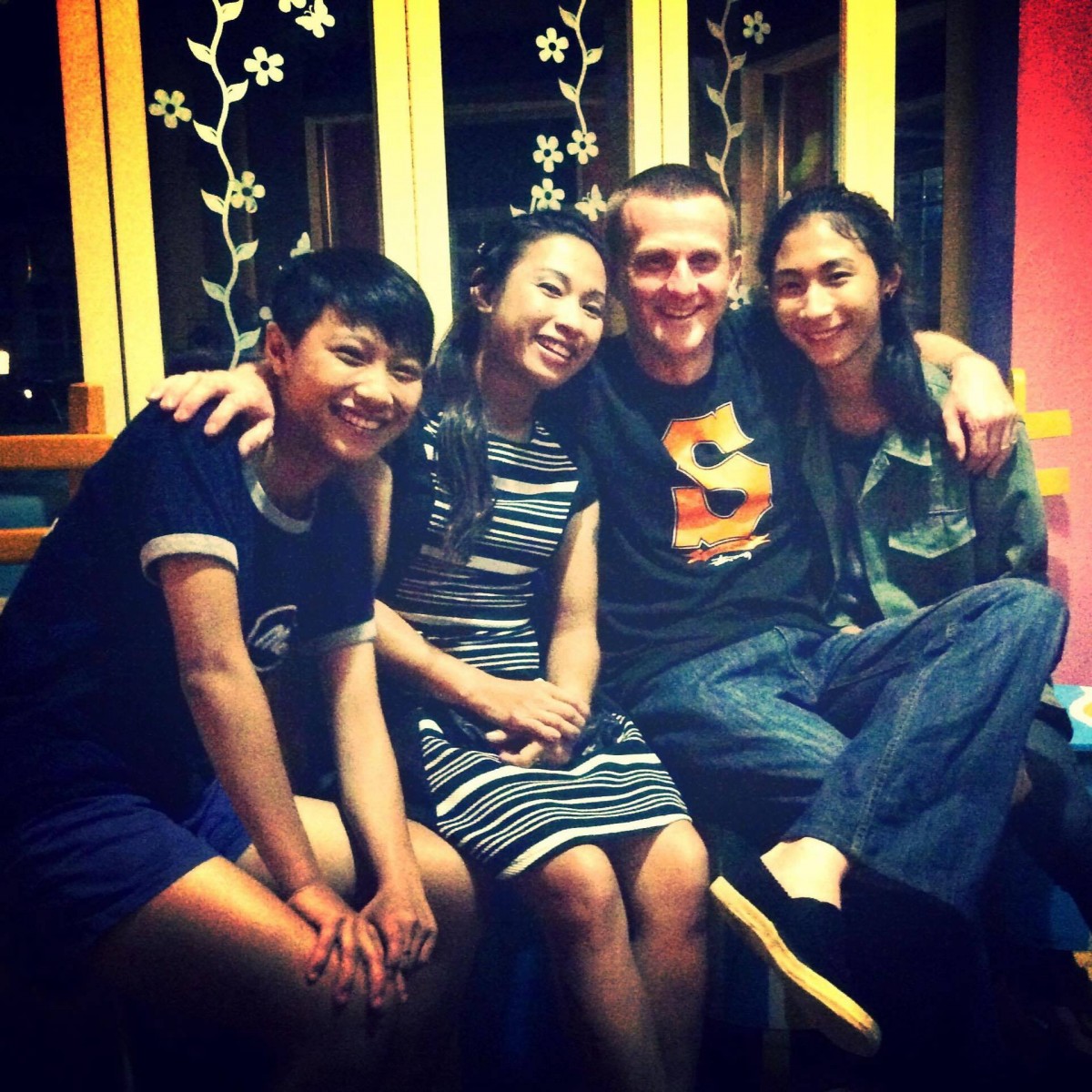 “Now we’re just the same as any family. I do the best job I can of being there for them and we all enjoy each other as much as we can. It’s very rural where we are in Fang so it makes for a different pace of life. I still swim a mile a day, I cycle, I run and my volunteering reminds me of the importance of focus, of balance, of finding a middle path between all the ups and downs that life throws at us.”
“Now we’re just the same as any family. I do the best job I can of being there for them and we all enjoy each other as much as we can. It’s very rural where we are in Fang so it makes for a different pace of life. I still swim a mile a day, I cycle, I run and my volunteering reminds me of the importance of focus, of balance, of finding a middle path between all the ups and downs that life throws at us.”
Graham now volunteers for the temple helping to run their temple stay, meditation retreat and monk ordination programs. He helps with work that the monks can’t be involved in – such as raising money for the foundation, and this is all carried out under the watchful eye of Tan Acharn Dr Apisit. I can tell you that he considers himself very fortunate indeed.
“The Temple Stay and meditation retreat is a programme that is open to all. Most of our guests stay for a couple of weeks and will spend a week at the temple learning more about meditation, chanting and the teachings of the Buddha and then a week at our purpose build retreat centre where they put all that new knowledge into place.
It’s an opportunity to take a step back from the busy life that we seem to think we must have and relax, unwind and look within. It’s not all just lounging around though as it’s a structured day with early morning and evening chanting, mediations sessions, noble silence, no eating in the afternoon, no music and a true focus on practice.”
As an aside, when I suggest I could do this my cousin and I dissolve into laughter at the thought of me being silent, noble or otherwise for longer than five minutes...
In order to do this job, to give it his full attention and undivided knowledge, Graham was invited by his mentor to spend time as a fully ordained monk.
“Most of the young boys or men in Thailand will spend time in robes at some stage in their life so short term ordination is not unusual and is very much seen as part of the culture. The Thai guy I ordained with had been a military man, he retired as a General and he ordained at 75.
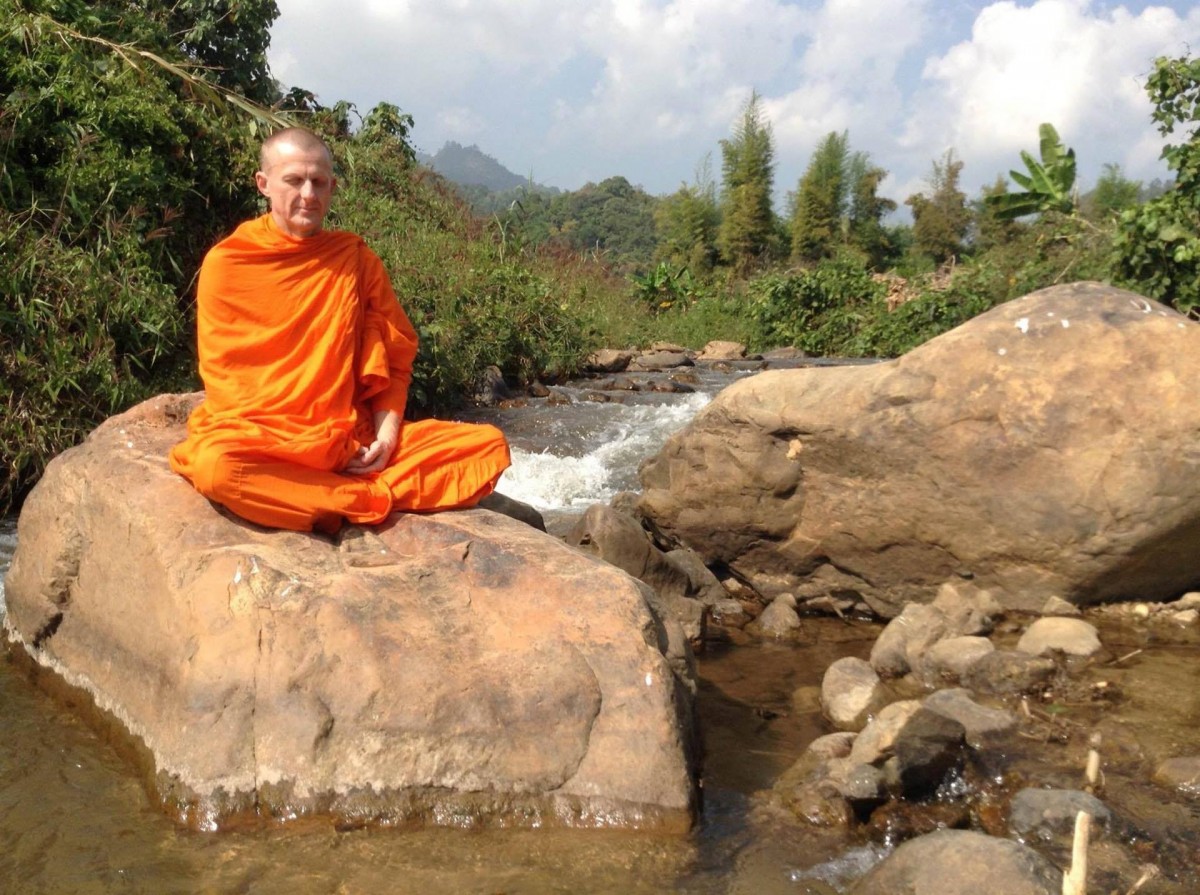
I could see why spending time as a monk would bring long-term benefits to the programme. It was essential that I could teach from the heart – not just from the book - and to do that you have to live the life. As a westerner helping with a program like this, helping to teach the dhamma in a temple in Thailand, it had to be authentic. I had to be willing to put myself through everything our guests would go through and more.
And so I found myself back in robes and this time ordained as a novice for three months before taking higher ordination as a monk. I spent my days learning Pali, the ancient language of Theravada Buddhism, studying Buddhist texts and spending prolonged periods of intensive meditation practice which included time in the Thai rain forest living in a bamboo shack with no running water or electricity. I loved it.
I studied literally at the feet of my teacher and my time as a monk not only helped us bond deeper but also helped to show the local community that I was here for all the right reasons and that I could be trusted to look after the reputation of their temple and, ultimately, the Dhamma.”
Graham lived as a monk for just over over a year, roasting in the summer while out on daily alms rounds, feet numb from the cold when the temperature dipped in the winter. He started his days with 4am chanting and continued studying, practicing and running the program seven days a week.
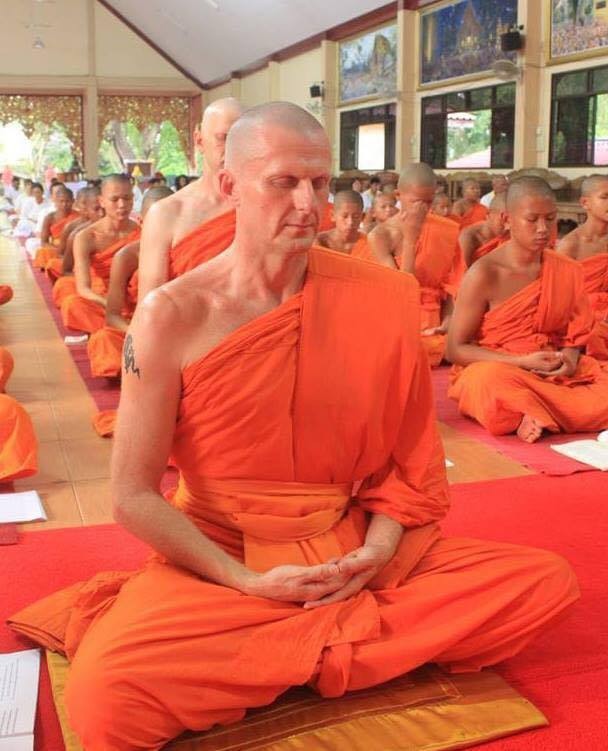
There was no Mew, no kids, no physical contact. Forget music for the man who had built his life on drums and live bands. There was no technology, no shoes and...gasp...no swimming!
“I did have moments when the enormity of it all would hit me. I would look down at my orange robes and say to myself... I’m a monk....on the Thai/Burma border.....how did this happen? I’d be sitting in a new house doing a blessing or chanting at a funereal and it would creep up on me.
The life of a monk is one of renunciation and as such you are completely dependent on the generosity of others for your continued existence. And the generosity that people showed towards us was just mind blowing, it humbled me every day.”
As you might image Western monks are not the norm and in a sleepy wee village in Northern Thailand Graham caused a few jaws to drop and even a bike or two to crash!
He has a huge amount of respect for his teacher, and considers him a man who walks the walk.
“He has a sense of calm and genuine warmth. An inner peace that we’re all looking for. That’s why when he told the village what we were doing, that I’d be staying to help at the temple with the organising and such like, everyone accepted it. They could see it was the right thing to do.”
Graham has come through his epic journey in one piece, a little bashed, a little wounded but with a new purpose and a set of values that have allowed him to be more mindful and content. His programme welcomes people of all faiths, and of no faith, from every corner of the world. Graham has seen, and continues to assist, former guests set up their own education projects that help others including schools for refugee children and scholarships for novice monks
“The effect is like ripples in a pond. Generosity of spirit spreads outwards and it is wonderful to be a part of that process.
When I set off for a retreat with guests I’m up in time to see the sun rise over the beautiful mountains and it often makes me think of Bonnie Scotland. I walk around the retreat which I have helped build and speak to people who have arrived at peace because it is there. We’ve received lovely feedback from some of our former guests who tell us that their lives have changed considerably thanks to their time with us.
One of the most touching tributes was by a South African guest who told me that my role here is taking in broken people and making them whole again. I’m not sure about that but its lovely to think that maybe everything that I went through is in some way helping other people have a second chance, just like others did for me. It may sound corny but it’s true.
Although it’s very difficult I can now see my illness as a gift. Without it I wouldn’t be here in this very special place with a very unique set of “qualifications” that enable me to help other people. It allowed me to reinvent “myself” and it taught me, and continues to teach me, very important lessons about life and love. Letting go of who I was back then was one of the hardest things I ever had to do and yet, “letting go” is a big part of what we help people do here and so it has come full circle, just as it should.
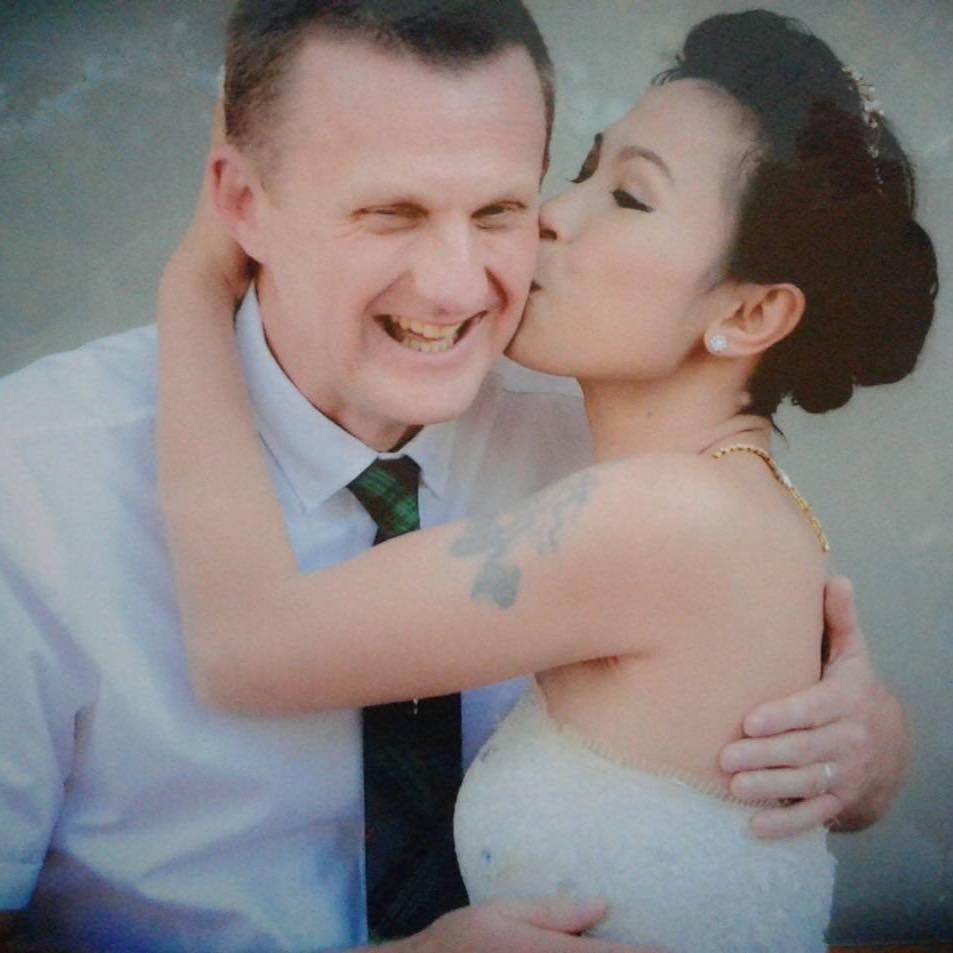 Now, I plan to study and learn every day through all possible sources; from the people I meet from around the globe to the amazing family I am blessed to share my life with. I am deeply grateful for the wonderful roller coaster that has been my life so far.”
Now, I plan to study and learn every day through all possible sources; from the people I meet from around the globe to the amazing family I am blessed to share my life with. I am deeply grateful for the wonderful roller coaster that has been my life so far.”
For those of you wondering what happened to the lovely Mew… Well, he married her of course. In a small ceremony in Fang with his Scottish family and her Thai one looking on, they signed a simple piece of paper and he made the gorgeous Mew, Wiyada Ross.
And they all lived happily ever after, in a wee white house on the top of the hill.
***
You won’t necessarily realise from the out-pouring of this tale that Graham Ross is an intensely private individual. I have bothered him within an inch of his life to do this, helped by his mum, my Auntie Margaret. It has been 15 months since that day in Parklands but he finally agreed to put his story out there in the hope that someone somewhere may take something from it. That maybe his tale will help someone else say, ‘I won’t give up – not today.’
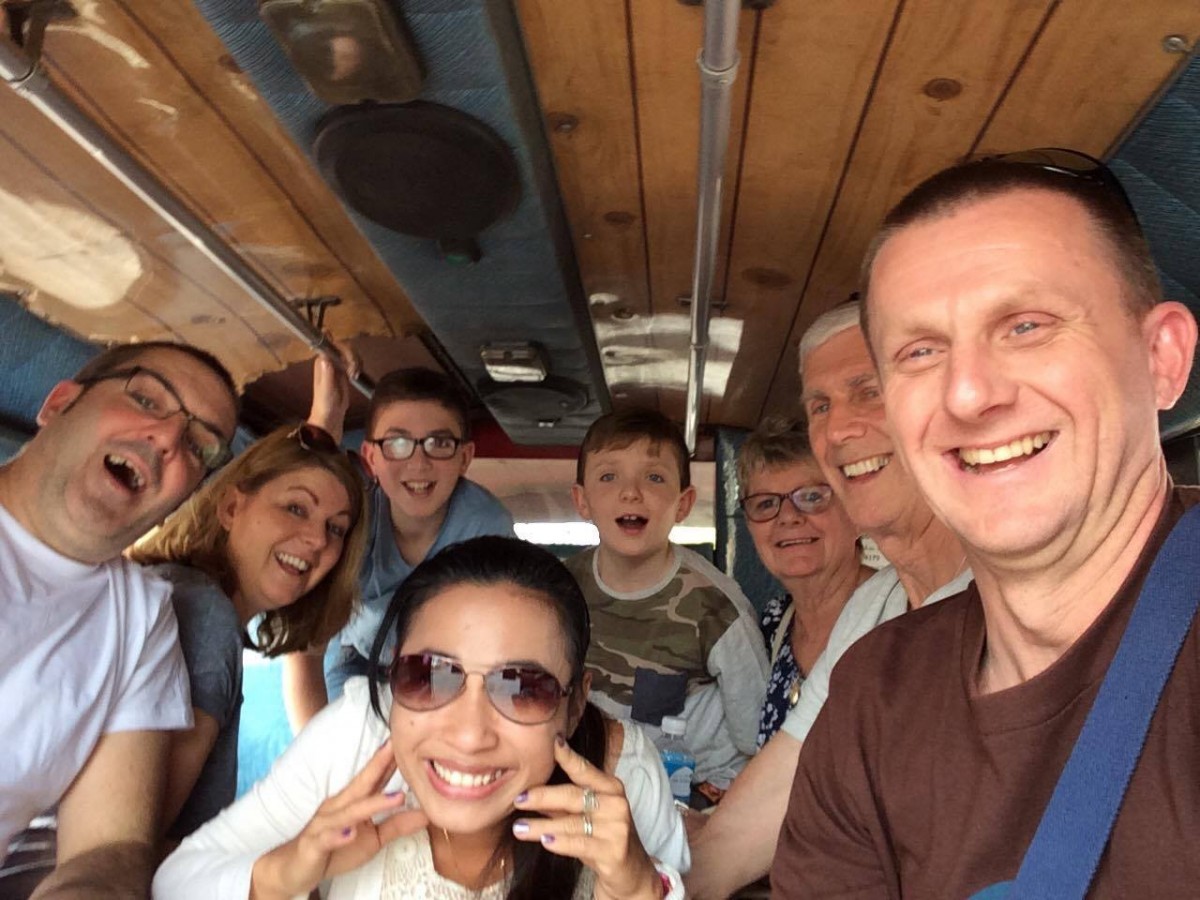
Graham Ross is my wee cousin. He will be 44 years old on Sunday, eleven days younger than me. I miss him every day, he is one of my favourite people in the whole world. But when I see him, living the life he was born to live I am humbled and ecstatic in equal measure.
If you’ve been inspired by Graham’s story and you’d like to experience a Temple Retreat within a Thai Buddhist community temple and to deeply immerse yourself in the daily practice of this ancient way of life then do look to the website.
Wat Sriboonruang| Website |
Temple Stay Thailand | Facebook
Ben Wilde has an impressive resume. At the age of 25 he is director of his own audio business with a solid reputation in the music industry, and a cli
November 2nd Friday 2018
You can take the boy out of Perth, put him on the world stage, applaud his dizzying success, and yet it seems you can't take Perth out of the boy.
October 19th Friday 2018
Scott Burton's path from troubled teenager to minister of St Matthews on Tay Street is as surprising as his pink mohawk! Here's how it all happened!
August 10th Friday 2018